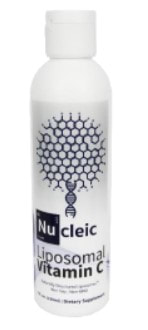
Contrary to popular belief, Vitamin C is not an immune system "booster". We do not want to "boost the immune system", as this can cause unfavorable side effects, such as inflammation and worsening allergy load.
Vitamin C, especially in a Liposome, has been shown to regulate or "modulate" the immune system. Modulation of immunity is key, as it up-regulates lowered immunity and down-regulates heightened immunity. Think immune system adaptogen!
Most practitioners of other brands use 5000 IU to 10,000 IU of Vitamin C to get a response. The Liposomal activity cuts this in half, as it bypasses the alimentary canal where most brands are lost. Practitioners have reported good outcomes in acute cases using a dosage of 4 teaspoons of Nucleic Liposomal C.
Just another way Nucleic gets you to the core, to the Nucleus.
Here's why Liposomal Vitamin C should be part of your Apothecary this allergy season.
- Vitamin C helps inactivate Histamine and Mast Cell reactions.
- Targeted Liposomes help delivery, going exactly to receptors that need inactivation such as TH1 and TH2
- Bronchial Hypersensitivity Inactivation (Asthma, Reactive Airway Etc.).
Areas of Research
- Immuno-Modulation
- Allergies
- Degenerative Conditions
- Epinephrine/Dopamine Regulation
- Neuronal Antioxidant (Stroke, TBI, Memory)
Vitamin C and Liposomal Technology Vitamin C has multiple beneficial physiological effects. These include antioxidant properties, synthesis of catecholamines, formation of collagen, facilitation of iron absorption, and support with the processing of many hormones, enzymes, and amino acids. In a recent clinical study, it was demonstrated that oral delivery of Liposomal Vitamin C produced circulating concentrations of vitamin C greater than those elicited by oral delivery of Non-Liposomal Vitamin C and has the added ability to cross through the Blood Brain Barrier.
Immuno-Modulation Vitamin C affects various aspects of the immune process. Its high concentration in leukocytes, its rapid utilization during infection, and its depression in clinical situations associated with reduced immunologic function have suggested a role for the vitamin in the immune response. There is evidence that Vitamin C is involved in several neutrophil functions, including chemotactic responses, phagocytosis, hexose monophosphate shunt activity, myeloperoxidase function, and cyclic GMP levels.
Degenerative Conditions Research suggests that high-dose vitamin C kills degenerative cells. New studies show some degenerative cells with low levels of catalase enzyme activity are much less capable of removing hydrogen peroxide formed by vitamin C, than normal cells, and are more susceptible to damage and death when they are exposed to high doses of vitamin C.
Norepinephrine/Dopamine Regulation Vitamin C functions as a neuromodulator for dopamine and norepinephrine. A deficiency of Vitamin C is associated with significant increases in dopamine levels and similar relative decreases in norepinephrine because normal amounts of dopamine could not be metabolized into norepinephrine. Liposomal Vitamin C is capable of crossing the blood-brain barrier to regulate dopamine and nor-epinephrine levels.
Neuronal antioxidant support Studies show Vitamin C is a vital antioxidant. Vitamin c has shown promise in its high antioxidant role against ischemic stroke, Alzheimer's disease, Parkinson's disease, and Huntingdon's disease.
Stroke Several studies found that a low vitamin C status in humans is associated with increased mortality rates from stroke, and plasma Vitamin C concentrations are decreased in stroke and critically ill patients. This data on antioxidant depletion suggests that there is significant oxidative stress associated with brain injury.
Post Traumatic Stress Disorder (PTSD) Oxidative stress is linked with many psychiatric conditions including PTSD. Vitamin C has successfully attenuated memory impairment and all changes observed in oxidative stress markers induced by PTSD.
Traumatic brain injury (TBI) TBI is an acquired brain injury that occurs when there is sudden trauma that leads to brain damage. There is evidence that a secondary injury from TBI is specifically related to oxidative stress. By incorporating antioxidant support with Vitamin C, clinicians can help attenuate oxidative posttraumatic brain damage and optimize patients' recovery.
Memory In a recent study vitamin C administration successfully attenuated memory impairment and all of the changes observed in oxidative stress markers. Oxidative stress is associated with neuronal damage in many brain regions including the hippocampus; an area in the brain responsible for memory processing.
Ingredients: Ascorbate Acid (Vitamin C), Sodium Ascorbate, Potassium Sorbate, Stevia Leaf Extract (as Glucosylsteviosides), Natural Flavors, Glycerin, Non-GMO Sunflower Lecithin, Purified Water.
Disclaimer: Nucleic products does not take liability or responsibility for any misuse of this informational research material. Information of our products is for educational purposes only and pulled from research journals cited. These products and informational documents are not intended to diagnose, treat or mitigate any disease. This product has not been evaluated by the FDA.
To purchase call our office at 530-878-1119, e-mail us at [email protected], or go to our web site at: https://www.joyfullivingservices.com/nucleic-products.html


 RSS Feed
RSS Feed



